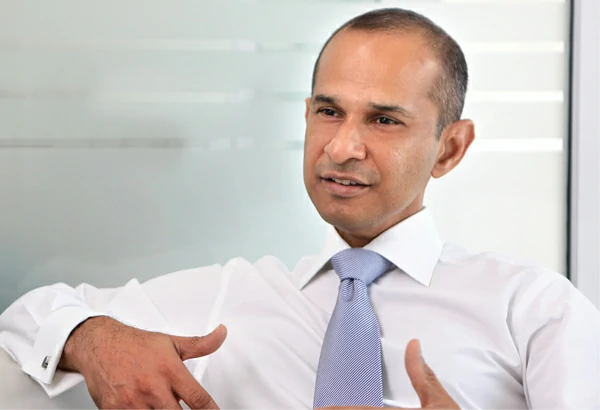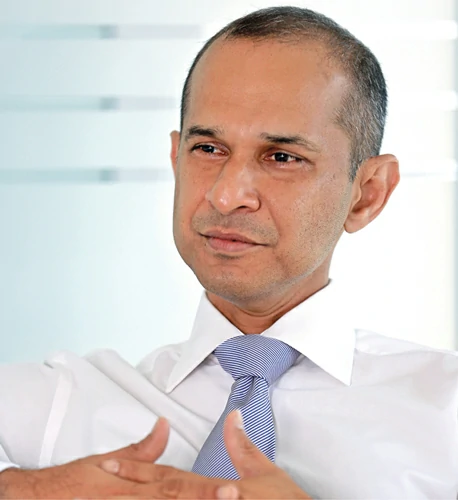
In the highly competitive and taxed automobile industry, Colonial Motors has been able to penetrate a niche market space and re-innovate the course of motor engineering, with its futuristic facilities and services. Managing Director Mohan Ratnayake speaks about the vision behind the company.
By Prasadini Nanayakkara and Keshini de Silva | Photography Isuru Upeksha
Colonial Motors has a long history. How far has the company travelled since its beginnings?
Colonial Motors was founded in 1909 as a motor engineering company, and we later progressed to becoming an automobile distributor since being appointed sole distributor for Land Rover in 1948. We also represented brands such as Fiat, Nash, Citroën, Rover, Alfa Romeo, Francis-Barnett motorcycles, and Lambretta scooters, but we phased these out for strategic reasons. One such example is moving away from Land Rover when it was purchased by BMW in 1994.
Over the last three years we have secured authorised dealership rights for Mazda, an agency that is yet to be harnessed to its full potential. We came into the market at a time when Mazda enthusiasts were neglected and the Mazda brand had been forgotten. However, since we introduced our services and facilities compliant with international standards, there has been a growth in Mazda clientele. On a par with world-class service offerings, we provide ample spare parts, international standard customer care and even online services. We have built an image that assures customers that they will be taken care of for life and that it’s not just another vehicle purchase.
What milestones has the company achieved?
The biggest milestone we have achieved, I believe, is the establishment of state-of-the-art workshops built on par with international standards. Our workshops are completely environmentally friendly, operating on renewable solar energy and recycled water. The facilities are soundproofed to minimise sound pollution. Staff wellbeing is also a priority, so we have built resting facilities for those who work late shifts. Equipped with machinery from Finland and Germany, including computerised paint booths, our workshops are built to represent the aura of a world-class brand like Mazda.
The locations of the workshops are also ideal, with easy accessibility. Our workshop in Peliyagoda is close to the Katunayake Expressway while the Battaramulla workshop is convenient for those travelling from the south. The area also offers us the chance to set up a test drive, where away from the hustle and bustle of Colombo, one can truly experience a drive, in a high-performance car like a Mazda. Meanwhile, the river-facing waiting room sets a pleasant atmosphere for customers, unlike the usual apprehensive workshop experience.
How has Mazda been able to set itself apart from the competition?
The competition we face in Sri Lanka is the same competition the Mazda brand faces internationally. Mazda has been able to set itself apart by standing against the flow, setting trends and using emerging technology.
For example, Mazda introduced the rotary combustion engine, the first of its kind, yet as time progressed, they developed the SKYACTIV engine. These are essentially ‘green’ engines, which signify Mazda’s move towards highly fuel-efficient and high-powered automobiles that ensure a smoother ride and support sustainability. The ‘green’ engines are built to utilise every last bit of fuel to gain that extra mileage for the driver. Each new development is based on Mazda’s ‘Jinbaittai’ philosophy, which means the connection between man and machine. The philosophy is derived from the relationship between the horse and its rider, where over time the horse eventually understands its rider and knows how to manoeuvre the way the rider wants. For Mazda this translates to an automobile understanding the driver and responding accordingly.
Mazda competes in a niche market, so how have you been able to penetrate this market?
Three or four years ago, there was hardly any Mazda presence in Sri Lanka, as opposed to today where you see a significant number of Mazda’s on the road. We see new buyers considering Mazda today, a brand that would not have been on their radar in the past. Ours is a very selective market, where customers focus on the design, performance and service-almost a sports car-like market.
Our easily accessible and futuristic workshops in Battaramulla and Peliyagoda are a discerning factor in targeting this market segment. These are equipped with comfortable waiting lounges with tea and coffee facilities overlooking the operations through a glass panel for customers who wait while their vehicle is serviced. A vehicle servicing generally takes around an hour and to date we haven’t had any complaints from customers about the time frame, possibly due to the comfort we offer as they wait. In addition, our other attractive services include online booking facilities and valet services.
Our customers also receive a loyalty card, which is linked to a database containing the vehicle’s maintenance history. This makes the knowledge transfer during a second-hand purchase easy, especially if the new owner continues to maintain the automobile with us. We also offer loyalty discounts.
What assurance do you give customers about the quality of your services?
We strive to give customers the experience that having their vehicle maintained or fixed at Colonial Motors is as good as getting it done at the factory in Hiroshima, Japan. Through our services and equipment, this is the type of confidence we hope to build. For example, all spare parts purchased from us include a warranty. We are yet to have an issue with any spare part sold, but this is a feature we provide to instil a sense of customer confidence in the brand.
Do you predict a growth in the automobile industry?
The middle class is growing and with its emergence we see a rise in the demand for high-end products, including automotive market. At the end of the day, everyone wants to own a car. In Sri Lanka, from the existing vehicle ownership of over 5.6 million, only 10 per cent own cars, significantly lower than most developing countries. So with many developments in the pipeline I believe we will see a growth in the automobile market.
The new budget foreshadows several regulations for the industry. What are your thoughts on the new developments?
The new regulations prove to offer a challenge, and I believe many importers are facing several issues. Although it will pose a challenge for us, as a financially strong group, we will not be too affected, especially as we are a regulated importer who deals directly with the manufacturer.
Ours Is A Very Selective Market, Where Customers Focus On The Design, Performance And Service –Almost A Sports Car-Like Market. Our Easily Accessible And Futuristic Workshops Are A Discerning Factor In Targeting This Market Segment.
Essentially, our only hope is that regulations be consistent, allowing us to plan for at least the next two years. We need the ability to plan in the medium and long term, something we have not had in the past. If you look at the customs policies and regulations in the past, there have been more than 35 revisions and it is not conducive for our line of work. At the moment I look forward to seeing how the new impact will unfold. I don’t deny that it will be a challenge, but we are firm believers that with a good product, service and price, there is every reason to succeed.
What do you believe is now needed in the automobile industry?
We would like to see strict regulations to ensure quality automobile imports. When a customer purchases a vehicle, they need to be assured of the quality and maintenance possibilities of the vehicle. We see second-hand vehicles that have been fixed up after accidents overseas entering the market. These are obviously cheaper than new vehicles and are market-driven imports. However, eventually the customer is paying for something they should not have paid for. Some of these vehicles may even lack basic safety functions required for this market.
Customers who purchase vehicles from us are assured that these have arrived from Japan. They are also assured the vehicles imported suit Sri Lankan conditions, especially in terms of the fuel and temperature. For example, Euro V fuel vehicles will not perform at their optimum in Sri Lanka. Therefore, if you import directly from the manufacturer, you make sure the car suits this environment.
Obviously, there are quality control regulations; however, these verifications need to be thorough. Existing processors may have loopholes and these need to be looked into.
What are your plans for the future?
We plan to import some new models, which are tipped to be released in 2016. Currently, all the available Mazda models are on the road, so we will launch new models as they are released.
We Strive To Give Customers The Experience That Having Their Vehicle Maintained Or Fixed At Colonial Motors Is As Good As Getting It Done At The Factory In Hiroshima, Japan. Through Our Services And Equipment, This Is The Type Of Confidence We Hope To Build
Also, we feel that we do more justice to the brand by continuously improving our facilities to ensure we offer futuristic services. The services Colonial Motors offer adds value to the brand. This is in line with our theme for the next few years: ‘Brand value management’.
What is your background, and how has it helped in your role at Colonial Motors?
I am an accountant by profession and this is my first experience in the automobile industry. Previously, I was in telecommunications with Sri Lanka Telecom, and I also have experience in the plantations industry. During my tenure at SLT, the company expanded at a rapid rate and we even oversaw the acquisition of Mobitel and floated the first international bond in Sri Lanka.
Personally, I feel my background in finance has helped me be versatile to master any role in any industry. If you have a vision or dream and work hard you will be able to achieve. But a background in finance is especially helpful when you climb the ladder and have to engage in planning, budgeting, identifying talent and reducing employee turnover.
I have of course now been at Colonial Motors for the past nine years and it has been a good experience. We have a very understanding and approachable board and they have created a conducive environment in which we can work with ease. Our parent company is also very supportive.
Final thoughts?
Most importantly, we would like to see consistency in regulations, whether it’s taxes or policies to ensure we are able to plan for the future, and in turn, we will also be able to create a happy working environment for our staff.
Colonial Motors also attributes its success to the staff. The company looks after them, and they are very happy here. We have employees who have been here for almost 35 or 40 years, which is saying something. Further we will continuously strive to provide world class facilities to our discerning Mazda customer base.






